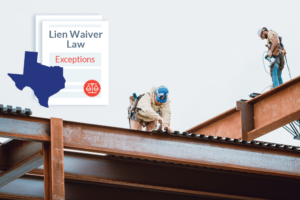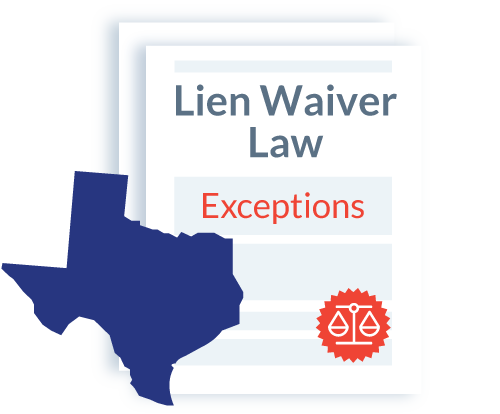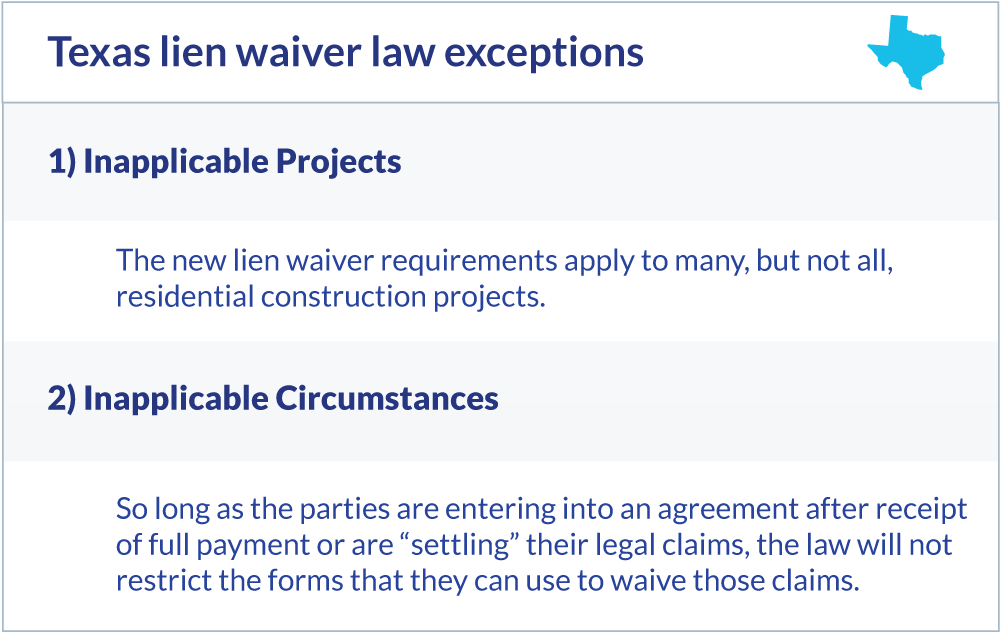
Last August, we wrote about a Texas 14th Division Court of Appeals decision overturning a $20m judgment in favor of Zachry Construction. That case – Port of Houston Authority v. Zachry Construction – centered on the validity and scope of a lien waiver document. The moral of the case brought me back to another article we’ve written here on the topic: Careful What You Waive You May Regret It. Texas Lien Waiver laws have recently changed what lien rights can and cannot be waived.
It joins the ranks of about 20 other states that actually prescribe the exact form that must be used when waiving lien rights. This post explores the details of this new law, the new forms required for Texas lien waivers, and the reasons why this expands the scope of mechanics lien protection for subcontractors and suppliers in the state.
No Lien Clause Now Likely Mostly Prohibited In Texas

The genesis of these clauses can be attributed to the on-going risk-shifting battle between those at the top of construction projects (general contractors, lenders and developers) and those further down (subcontractors and suppliers). We wrote about this battle here: Getting Paid In The Construction Industry: A War Between Policy, Contract And Tempers.
Generally speaking, primes and developers want to minimize their exposure to mechanics lien claims. They strong arm lower-tiered parties with less negotiating power into signing contracts waiving lien rights. Many states have chimed in by passing laws or issuing court judgments declaring this practice illegal and against the state’s public policy of protecting subcontractors and suppliers. Until recently, Texas was not one of those states.
Recently enacted Texas laws on lien waivers, however, likely change this. I leave the qualifying word “likely” in the sentence because in true Texas form, the statute is not perfectly clear on the matter.
Texas Property Code § 53.281 et seq now provides that “[a]ny waiver or release of a lien or payment bond claim under this chapter [re: private construction] is unenforceable unless a waiver or release is executed and delivered in accordance with this subchapter.” The designated subchapter has two provisions that suggest No Lien Clauses are now invalid:
§53.281(b)(3): A waiver and release is effective…only if…(3) in the case of a conditional release, evidence of payment to the claimant exists.
§53.283: A person may not require a claimant or potential claimant to execute an unconditional waiver and release for a progress payment or final payment amount unless the claimant or potential claimant received payment in that amount in good and sufficient funds.
The way I read this is that mechanics lien waivers must come in one of two forms: (i) conditional; or (ii) unconditional. §53.281 requires payment to validate a conditional release and §53.283 requires payment to validate an unconditional release. Therefore, lien rights cannot be waived before payment is received.
Texas Now Has Statutory Lien Waiver Forms
States fall into one of two categories: (1) They either have defined statutory lien waiver forms that must be used by every party; or (2) They are the Wild Wild West and allow the parties to create their own lien waiver forms.
Unfortunately, most states allow the parties to draft and sign their own lien waiver forms. I say unfortunately because this results in a lot of inconsistencies within the state about lien waiver rules, the fairness afforded to all parties, court intervention into disputes about lien waivers, and the like.
There are a healthy number of states that do prescribe the form to be used in a lien waiver event. Texas has now joined the ranks of these states. §53.284 provides 4 different forms that must be used to waive lien rights. Otherwise, the forms are unenforceable.
Oh, But There Are Exceptions Regarding New Texas Lien Waivers
Did I mention there are exceptions to the new rule?
If you are familiar with law, you know that the first rule of law is that there are exceptions to every law. And, if you are familiar with Texas’ mechanics lien laws you know that they are the most confusing and convoluted in all of the world, and accordingly, it would be impossible for the Texas legislature to pass an amendment displaying true clarity.
Looper Reed’s Texas Subcontractor & Supplier Legal Guide Blog published a great post last week outlining the exceptions to the state’s new lien waiver rules, and I recommend you head over there to read Joe Virene’s post. I will separate the exceptions into two broad categories:
1) Inapplicable Projects
First, the Texas law change only applies to certain types of projects and circumstances.
The new lien waiver requirements apply to most private construction projects, but do not apply to any public (state, city, federal, government) projects (See: The Difference Between Public and Private Projects). And of course, if it is not a construction project at all, the rules do not apply, such as is the case with other non-construction lien claims like mineral liens.
There is an exception within the world of private construction projects, however. Actually, I find this to be a bit odd, and probably the work of some lobbyist. Nevertheless, it is there. The new lien waiver requirements apply to many, but not all, residential construction projects.
§53.282(a)(3) provides an exception for lien waivers contained within “a written original contract or subcontract for the construction, remodel, or repair of a single-family house, townhouse, or duplex or for land development related to a single-family house, townhouse, or duplex” and “made before labor or materials are provided under the original contract or subcontract.”
This is a weird and thorny exception because it’s unlikely that anyone will know it very well, and it’s unfortunate for those in residential construction because they’ll have to determine which law applies on a case-by-case basis.
2) Inapplicable Circumstances
The second exception to the Texas law change applies to certain exempt circumstances. These typically fall into the category of true settlement agreements, as the legislators seemed concerned about restricting the ability to legally settle claims and disputes with more flexibility than the prescribed lien waiver forms.
Therefore, so long as the parties are entering into an agreement after receipt of full payment or are “settling” their legal claims, the law will not restrict the forms that they can use to waive those claims. It will be interesting to see where the courts draw the line between settlements and lien waivers.
Send or Request Texas Mechanics Lien Waiver For Free
Some other good resources to explain these law changes include:
- Carrington Coleman Update: Statutory Form Now Required For Construction Mechanic’s Lien Releases
- Lien Waivers and Retainage Notices




